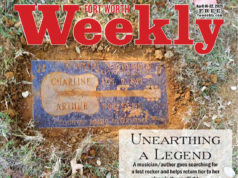Richard Wilkinson spent his early years wildcatting all over Texas in search of oil. During a stint in the Army in the ’50s, he fired high-caliber warning shots at Russian airplanes wandering into North Pole airspace. He spent decades after that building things – airplanes, guitars. These days, 74-year-old Wilkinson spends his time in a new role: vigilante on behalf of Denton County’s water.
He’s convinced that he must protect this resource from a rampaging threat: the Barnett Shale drilling boom. “We have to find a way,” he said, “to hold the oil and gas operators accountable. “Denton County may seem a more rural, less populous landscape than Tarrant, but the Barnett Shale exploration hit it earlier and harder. Long-time residents say it seems like there are more gas wells than people. Not quite: According to the Texas Railroad Commission, Denton, the 30th fastest-growing county in the country, has more than 2,200 gas wells, or about one for every 264 people. By comparison, Tarrant County, which is also part of the Barnett Shale “core” (the area where the prospects for gas are highest), has 1,044 wells, or one for every 1,645 residents. 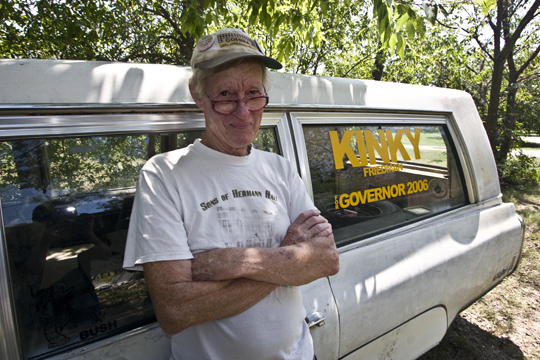
In Ponder, Wilkinson’s hometown, the drilling has happened almost unchecked. Drilling rigs, storage tanks, separating tanks, exposed pipes, and mixing ponds blanket the vast lots. A nonstop parade of gas company vehicles rolls up and down the once-tranquil country roads, including a tanker filled with drilling wastewater that overturned on a highway on-ramp in October, killing its driver. And with the wells come other developments, including pipelines to carry the gas to market, all of which are transforming the little town and surrounding ranchland into an industrial maze. If you see a map of them, said Wilkinson, “it’s just like a spider’s web, like almost everything underground is pipes.”
Now, however, the drilling rigs are moving from the countryside toward developed exurbs, like Highland Village and Flower Mound, and towns are responding with strict ordinances that drillers are challenging in court. Homeowners and city leaders are concerned, of course, about a short-term economic boom versus long-term impact of the drilling. In Denton County, that long-term impact could hit home very quickly, in the strain on the region’s water supplies. The Texas Water Development Board estimates that in fewer than than two years – by 2010 – demand for water in Denton County will exceed the available supply. Pressure from Wilkinson and others for regional planning to stave off the impending crisis has been met with governmental apathy.
Don Young figures Tarrant County should watch and learn from what’s going on just over its northern border. “I’ve referred to Denton as the canary in the coal mine for Fort Worth to watch,” said Young, one of the earliest and staunchest Fort Worth opponents of urban gas drilling and founder of Fort Worth Citizens Against Neighborhood Drilling Ordinance, or FWCanDo. “There’s plenty to learn, but the city of Fort Worth is going to do it their way, and I don’t think they’re going to learn much. They’re in bed with the gas drilling industry.”
Wilkinson saw the damage that excessive oil drilling wreaked on West Texas and the Gulf Coast in decades past. Just as he protected American airspace during the Cold War, he is keen to save North Texas’ environment from the drilling. “You don’t hear what the future is going to be like for our kids,” said Wilkinson. “Rusty old tanks, garbage everywhere, ruined soil – that’s what the future is going to be.”
Wilkinson considers himself a lonely crusader. He represents Ponder on the board of the Upper Trinity Regional Water District, created by the state in 1989 to manage surface water in Denton County. He spends his days driving around looking for new gas well developments around Ponder. His ride, bought at an auction, is a battered hearse with busted headlights, decorated with “Kinky Friedman for Governor” stickers, and it has explored almost every gravel road in the town. Wilkinson’s findings – he always carries a digital recorder and two cameras – are shared with other activists. For instance, Wilkinson has witnessed gas field workers rinsing old, rusty tanks in a hole in the ground. The hole keeps the polluted water from running off into nearby creeks immediately, but the runoff leaches into the soil and eventually into groundwater anyway.
“Whoever [owns] that land says, ‘God, I hope they get that pipe in there; I can’t wait for my first check,’ ” said Wilkinson, just before a vigorous fit of coughing overtook him. He uses one unprintable word or another in most sentences. He said he can’t keep up with all the drilling activity around him. Contacting the Railroad Commission, the state agency charged with regulating the oil and gas drilling, he said, is like “pissing in the wind.” He worries especially about groundwater – Ponder’s 507 residents rely almost exclusively on water wells, and the water table, he said, has dropped precipitously since the drillers came. Municipal water lines are still years away for the little town just west of I-35, best known for its boots and chicken-fried steaks.
The geologic formation that’s causing all this commotion was formed 330 million years ago, when North Texas was covered by a shallow ocean. It teemed with microscopic organisms that soaked up and stored the sun’s energy and eventually died and sank to the sea floor. Then, about 260 million years ago, the continental plate of what is now Africa and Europe collided with North America, sculpting the Appalachian and Ouachita mountain ranges and pancaking the organic mass buried on the floor of the former sea into shale, a dense coal-like mineral.
The shale, named after 19th-century San Saba County settler John W. Barnett, lies almost two miles underground, sandwiched between layers of limestone, like a mineral Oreo cookie, and ranges between 400 to 1,000 feet in thickness. Geologists had long known that the Barnett Shale held massive reserves of natural gas – as much as 30 trillion cubic feet – but it wasn’t until a few years ago that it became economically viable to exploit, thanks to two new technologies: horizontal drilling and water fraccing (short for “fracturing”), where a powerful jet of water shatters the shale and releases the gas. It’s a little like a dentist’s drill, only liquid. Previously, fraccing had used an expensive gel; the new water-based technique uses instead a substance that drillers can draw out of the ground free or buy for almost nothing. In the city of Denton, about $10,000 buys enough to drill an average well.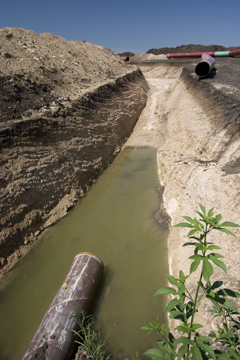
Drilling a gas well takes an average of 3.5 million gallons of water, about five Olympic-sized pools’ worth. Because it is mixed with chemicals to keep the gas flowing, the flowback water is mostly contaminated into uselessness. Unless it’s recycled, it has to be pumped into injection disposal wells, taking it permanently (or so the drillers say) out of the water cycle. Wilkinson has tried to get Denton County officials to start a groundwater conservation district, which would manage and protect the region’s groundwater as the Upper Trinity does for surface water. In November, he met with Andy Eads, county commissioner for precinct 4, which encompasses almost all of the western part of the county, including Denton, Flower Mound, Ponder, parts of Southlake and north Fort Worth, and large tracts of unincorporated land. Tarrant County, like Denton, doesn’t have a groundwater conservation district. And besides, the energy industry has managed to keep itself exempt from the districts.
Wilkinson came prepared with an agenda. Eads rocked in his chair, twirled his pen, and played with his phone. “The county has to investigate the pros and cons,” Eads said. The whole process could take as long as two years, and there would be reluctance among some commissioners to add “another layer of government.” The fact is, Eads said, “It takes the media to get anything done.” “Anything’s better than not having water,” Wilkinson pointed out.
A few weeks later, Wilkinson wrote in an e-mail about the progress of the groundwater conservation district after he spoke to the county commissioner’s court. “The ball is in their court, but they still won’t do anything,” he wrote. “All they can see is gas company dollar signs, which are fine with them because it gives them more money to play with and look good to the public and stay in office.” But he remains optimistic and adamant. “These things take time and incidents along the way until [they are] forced to get off their ass and take care of the public as they swore to do when they were elected,” he said. “I suggested they turn off all water for two days and then check their popularity rating.” As of July, the county had done nothing about the groundwater conservation district. Eads said the commissioners have “talked about it,” but it has not been a formal agenda item. “We realize it’s an issue we’ll have to deal with sooner or later,” he said.
County Judge Mary Horn is more vocal on the issue. She said that the state is mandating counties to start groundwater conservation districts in the next two years – if they don’t, the Texas Commission on Environmental Quality will force one on them. In the 2007 legislative session, State Sen. Craig Estes won approval for a district for Hood, Montague, Parker, and Wise counties that would for the first time make oil and gas operators accountable for their groundwater use. “To my knowledge, that is the only groundwater conservation district where the companies were included,” Horn said. “I would want the same for our own district.”
Horn said that she would like Estes to mandate a district for Denton and certain neighboring counties in next year’s legislative session. A 2003 report from the Texas Water Development Board calculated that Denton County’s growing population would face a shortfall of almost 21,000 acre-feet of water by 2010, growing to a frightening deficit of about 235,000 acre-feet by 2050, when the entire North Texas region will require more than twice as much water as is available now. (Tarrant County too is expected to be overdrawing its water account by 2010.)
“Well, I don’t know about that,” Horn said. “The reason I say that is because we’ve got wonderful organizations like the Upper Trinity [Regional Water District] that have done so much to provide us with water. If our only source was to drill water out of the ground, that would be true, but it’s not. That’s why Upper Trinity was created many years ago. We’re in better shape than they give us credit for. I don’t want to create a worry where there isn’t one.” Wilkinson, who sits on the UTRWD board, agrees with Horn that the study is probably pessimistic, since the water district has to make 50-year plans. But he still worries about the pollution of the region’s water and the increasing cost of making it potable. At the July meeting of the board, the budget report was gloomy- as with oil, the price of cleaning agents has skyrocketed in recent months due to rising global demand.
Most of the drilling in Denton County so far has taken place in rural areas, like Richard Webster’s ranch in Ponder, 300 acres of land that his father bought in 1945 and farmed and ranched until his death two years ago. Now his son carries on, raising 500 head of cattle and growing milo and wheat. At 63, Webster has an infectious, joyous personality. The ranching life is hard these days, but he can’t imagine doing anything else. “This is a way of life,” he said. “The big problem is the amount of money it takes. A tractor now costs hundreds of thousands of dollars, and borrowing money is tough. You couldn’t get into it now.”
In 2002, Devon Energy made Webster and his neighbors a mineral lease offer. They took it. Now there are 17 wells around them, and the gas money is flowing. Webster drove a reporter around in his maroon Ford pickup truck on a dreary day when the fog was as thick as the chicken-fried steak in Ponder’s famed diner. “The gas has its good, its bad, and its ugly,” he said. “It brings in extra money, but half of every check goes to taxes. But you just go to the post office every month and get a check.
“Devon gives you good gravel roads, good cattle guards. We can’t complain,” he said. Webster says that people talk about energy independence, and, to him, drilling the Barnett Shale is just that. The pad sites are well maintained, and he sees workers and regulators inspecting them frequently.
The only major way in which Devon has failed, Webster said, is it didn’t inform the community of an injection disposal well that it drilled not far from his home. The operator didn’t tell residents about it to avoid the chance that the community would shoot that project down, he said. In Fort Worth, such a well would require a permit; out in the county, drillers can poke a hole and put their polluted water in it wherever they choose. Devon uses water from Webster’s own well, and thus far, he said, he’s seen no effects on the quality of his drinking water. “I can’t complain about the water,” he said. “They paid me for my water when they drilled. If they hadn’t, they would have found another way to get it. But we’re going to pay for it at some point when the water tables drop.” Beckie Belcher is one of Denton County’s newer residents. She and her husband, a retired jeweler, moved to Flower Mound from Amarillo in 2002, after looking at homes in Keller, Colleyville, and Southlake. As opposed to Amarillo (“Brown,” she said), “We thought [Flower Mound] was pretty, with all the trees and green spaces.”
Flower Mound has made the list of America’s fastest-growing towns for years – between 1990 and 2006 the population grew from about 15,500 to about 63,500. The Belchers’ surroundings couldn’t be more different from Richard Webster’s ranch. Their home sits on a typical one-quarter-acre lot in a subdivision called Woodland Estates. The gas drillers have come knocking here too, however. Cherokee Horn, a small gas developer, is trying to piece together enough acreage to drill in the neighborhood. Unlike Webster, however, the Belchers don’t want a gas well nearby. Belcher started Flower Mound Citizens Against Urban Drilling, based on Don Young’s FWCanDo. The Belchers have gone around trying to convince their neighbors to turn down Cherokee Horn’s offers. “I didn’t know about any of this gas drilling until we got a letter from Cherokee Horn in February,” Belcher said. “There’s no amount of money that will convince me it’s OK to put a gas well near my house.”
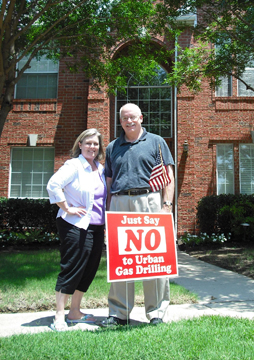
After the well is in place, Belcher said, there will come the pipelines to transport the gas for processing. “The people who think they will be far away and don’t care about the drilling don’t know about the pipelines,” she said. The Belchers say Cherokee Horn has offered property owners bonuses of $2,500 per acre. For the Belchers, “that’s $625 and royalties of $20 to $50 a month,” she said. “It’s a ridiculous amount. But some people only see dollar signs and say, ‘Whoo-hoo, we’re going to get rich.'” The couple has put “Say No to Urban Gas Drilling” signs on their lawn and convinced some neighbors to join them. Others have leased their mineral rights to Cherokee Horn. On some streets, houses opposite each other have battling signs, after Cherokee Horn recently distributed signs saying “Naturally, gas is good,” “More American fuel resources,” and “Barnett Shale: I’m all in.” The company paid people to put the signs in their yards.
Angela Hartman, a landman for Cherokee Horn, said that the company has signed about 400 acres in the area, about half of what it needs to drill. “There’s a lot of misinformation promoted about the hazards and dangers [of drilling],” she said. “In reality, everything is regulated by the Railroad Commission and the state and towns. The concerns are a little bit overblown.” Drilling in an urban environment is an “education process,” she said, and the signs are part of it. “It’s a way for neighbors to express themselves. There’s several points of view. It’s an advertising expense.” Hartman declined to say how much homeowners were paid to display the signs. If homeowners want, she said, “they can donate the money to a charity of their choice.”
Belcher and her husband picket on the town’s streets on weekends. They are quick to point out that they aren’t opposed to all natural gas drilling, just that which takes place in urban areas. “We’re accused of being NIMBYs – ‘not in my backyard’ types,” she said. “I won’t deny that, but we’re also ‘not in your backyard.’ Nobody moved to Flower Mound so they could put heavy industry next to their home. And people who bought expensive homes in subdivisions where the developer retained the mineral rights have no recourse.”
The town of Flower Mound saw the Barnett Shale coming and enacted oil and gas drilling ordinances in 2003 that are considered the toughest in the state. The town requires a 1,000-foot setback between gas wells and homes, churches, schools, and other sensitive structures, with a possibility of variances to reduce that to 500 feet. The setback requirement effectively made drilling impossible in most of the densely populated parts of the town. According to Matthew Woods, director of environmental services for the town, most of Flower Mound’s permitted gas wells have required variances from the town. The setback has made drilling difficult for Red Oak Gas, a Houston-based driller that has leased mineral rights to a 134-acre tract in the middle of town, the choicest piece of real estate in Flower Mound and one that the town is keen to see developed. The company that owns the land wants to transform it into “Flower Mound’s 21st-century downtown,” a residential and commercial complex to be called the River Walk at Central Park. Unfortunately for Red Oak, its proposed well site is 779 feet from First Baptist Church and 695 feet from Applewood Daycare. Red Oak requested 15 variances from the town’s Oil and Gas Board of Appeals but was turned down. Rather than give up, the company filed suit against Flower Mound fewer than two weeks later. Woods declined to comment on the lawsuit, and Red Oak did not respond to messages left by Fort Worth Weekly.
“We’re in a fight for our homes, our neighborhoods, and maybe our health,” said Belcher. “We don’t know what junk will come up out of the ground or if it will explode. I’m tired of hearing that the town will be sued. It has a responsibility to protect its residents.” There’s a limit to what cities can do in such cases. John Baen, a regional vice president of the Texas Land and Mineral Owners Association, said the mineral estate rules all in Texas. Cities that exercise a heavy hand in restricting drilling could face lawsuits from unhappy landowners who feel their mineral rights are being trampled. “Under the [Texas] constitution, [cities] owe every mineral owner and every oil lease owner the full value of the present value of the minerals” if ordinances make drilling impractical, he said. How much is that? About $25,000 an acre in North Texas, according to Baen.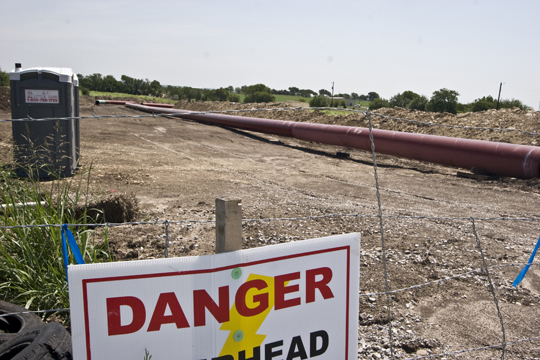
Baen, who is also a professor of real estate law at the University of North Texas, has spent almost two decades researching just how far gas developers can be pushed when a landowner wants to negotiate a lease. He speaks in rapid-fire bursts, and his expertise is in such great demand that he can never talk for more than a few minutes at a time. Texas has been good to him, and he wears gold cufflinks with the state seal. His work hasn’t made him popular with the wildcatters, but it has earned him the gratitude of hundreds of landowners across the state, as well as a nice chunk of change. The profits Baen makes from the concessions he extracts from gas companies’ leases are split with grateful landowners.
Without someone like him to keep them in check, Baen said, gas developers take as much as they can for as little as possible. “Most leases say the developer owns the pad and has the rights to drill to the center of the Earth,” he said. “Not my leases. If they drill for gas at 9,000 feet, they only have rights to drill that deep. If there’s other stuff further down, I own it and want to make a new deal.” Making sure that gas companies pay the damages they owe for causing damage to properties is also important, but it’s a point that – not surprisingly – doesn’t come up much in lease contracts drafted by the gas companies.
Quentin Hix, a large, affable man with an open mien, is the town manager of Copper Canyon, north of Flower Mound. There’s no canyon and no copper – the town was named after the copperhead snakes that were abundant in earlier days. Four years ago, Hix was working for the city of Denton, trying to find a way to make gas companies pay their fair share for the roads that were being wrecked by the construction of gas wells all over town. “When they hired me, the objective was ‘Can we recover our cost of road maintenance?’ ” he said. “It quickly turned into gas well management. The Barnett Shale boom affected everything – roads, regulatory, safety, environmental issues, they all accrued to my position.” Hix came to an agreement with operators in Denton after various roads were damaged by the heavy traffic, although, he said “they didn’t expect to be charged at all at first for road damage.”
He came to Copper Canyon in 2006, a town until then untouched by the boom. But now the rigs are at the gates, and Hix finds himself in the position of trying to limit the nuisances that gas development can unleash on a small, inexperienced town – the noise, the lights, the endless traffic. The town had one well as of last year; now there are nine permitted. “In a small town with limited staff, the gas wells take up a significant amount of my time,” he said, laughing. “You only have two choices: I can gnash my teeth and pull my hair, or take it in stride and make sure the rights of all our residents are looked after and they get service from the town.”
Copper Canyon ordinances are similar to Flower Mound’s he said, but Copper Canyon’s council “can review the application and talk to the operator and require mitigation of noise and landscaping and do some things to make the pad site more compatible and acceptable to [reduce setbacks from] surrounding residences down to 300 feet, if it’s reasonable to do so.” In the case of one permit, the town required a 30-foot-tall sound-blanket to dampen the noise of drilling for residents of nearby homes. “It was a reasonable requirement for protecting the neighborhood next to the well,” he said. “People in Copper Canyon are happy. We have primarily country-estate residential development. Most of our residential property owners own the acreage and the mineral rights. They’re interested in accessing their mineral rights.” And the people who don’t own their minerals? “Those that only own the surface will look at [the drilling] a little more carefully, how it impacts their quality of life.”
Judge Horn’s main concern is the damage that energy operators’ vehicles have on county roads. “They pay a fee for these vehicles to travel,” she said. “But the fee, although it was doubled in the last legislative session, is a drop in the bucket compared to the damage they do to county roads.” And the discord that the drilling is creating between neighbors in Denton County? “The closer they get to homes, the more discontent you’ll hear about,” Horn said. “Once they start drilling, it can get pretty loud. But it’s energy. And when I come in to the office and turn on the lights, it’s real nice they come on.”





